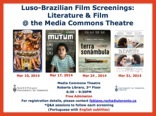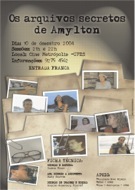Hudson Moura
Projects
research
Mouvance, Adaptation and Cultural Translations
This research aims to examine and to question the relationship between literature and film studies. Also, it aims to find new critical paths and other possible perceptions on contemporary Luso-Brazilian cinema and literature. Beyond bringing up the discussion of adaptation and screenwriting, the relationship between cinema and literature calls up images that cross the boundaries of written and visual texts and result in other ways of seeing and telling. For instance, how does film break into literary tradition? How does cinematic experience mobilize literary matrices? And what has Luso-Brazilian literature been embodying from the cinematic experience? Mouvance is understood as the spatialization of the voice and the senses. Paul Zumthor proposes this concept as a way to think about the transmission of poetic texts from the diversity of an orality approach from the most varied cultures, such as Brazilian and African, or from Portuguese or medieval traditions. While avoiding ethnocentric or ethnological conceptions and refusing the idea of interpretation, the author conceives the idea of mouvance as a continuous reformulation.
Glauber Rocha’s Legacy
Glauber Rocha developed throughout his career unique and distinct filmmaking techniques. He began his work in cinema at the end of the 1950s, and he has received impressive professional recognition as a director and screenwriter as well as a writer and journalist. Most importantly, he has particular concerns regarding his own work as filmmaker as well as singular assumptions about cinema’s potential role in contemporary society. By the generations following him, he is acknowledged as being one of the most influential filmmakers in film’s history. Rocha—known for his political and visceral approach to history—delivered a body of films, books, manifestos, and TV programs which were the angriest and most overpowering in Brazilian culture. Ongoing, substantial critical literature and documentaries surrounding Rocha’s legacy underscores its enduring and significant influence on filmmakers, critics, and scholars around the world.
documentary
My documentarian productions have explored issues such as diaspora and digital society and have profiled Brazilian writers and artists, such as Orides Fontela and Amylton de Almeida. Presently I am working with Ryan Lee in the editing of “Tears and Soul,” two documentaries (feature and short) on contemporary dance featuring Brazilian-Canadian dancer Newton Moraes and his dance company. The documentaries are produced by Tidal Pictures (In Post-Production)
film screenings
Luso-Brazilian Film Screenings @ the Media Commons Theatre
In collaboration with the University of Toronto Libraries, we organize twice a year a Luso-Brazilian Film Screenings during a whole month at the Media Commons Theatre (Robarts Library, 3rd floor).
March 2014: Literature & Cinema
November 2014: Exile & Diaspora
The complex unity constituted by the collectivity of its material versions; the synthesis of the signs employed by the successive “authors” (singers, reciters, copyists) and of the literality of the texts... The work is fundamentally mobile (mouvant).
Paul Zumthor




